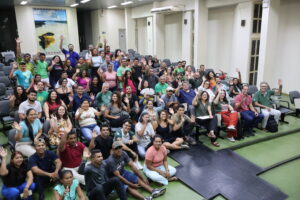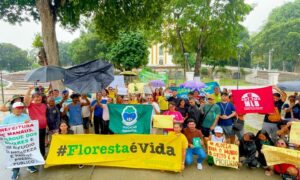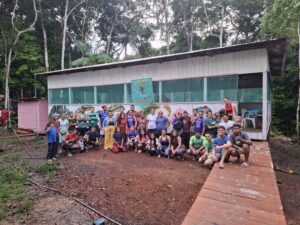By Iohara Quirino, Amanda Oliveira e Maíra Pivato
In a mind-boggling academic race for publications, project approvals and university vacancies, the truth is that women are constantly behind men. We know that gender inequality is a fact present in the whole of society. For centuries, we women have shown dissatisfaction with the way we are treated in our homes, in the work environment and because we lack opportunities just because we are women. In recent years, through the constant use of various social networks, we have had greater courage to share our experiences and denounce negative situations that we experience daily. Among these situations, the scientific community does not escape and it shows us that gender inequality has deep roots.
There is a stereotype that the scientific community is made up only of men or that they are better researchers than women. This creates a lack of opportunities and incentives for girls to learn about their scientific careers as children. At school, the debate about gender inequality in science is still timid and the examples of scientists are mostly men. Thus, there is a difficulty for girls to be interested in subjects that they can relate to and they end up taking up little space in, for example, engineering degrees. Taking a racial view, black girls find it more difficult to enter the scientific career due to the history of racial segregation, even though black women have great contributions to scientific production. In crisis situations, like a virus that spreads quickly and prevents us from living normally, our situation as a woman in science tends to get worse.
The novel coronavirus pandemic ended up exacerbating political, economic and social weaknesses, highlighting inequalities. In this context, women have been affected in many ways, starting with health professionals and caregivers, who are mostly women, leading to greater exposure and vulnerability to the disease. At home, women overburden themselves with unpaid housework, devoting more hours per week than men, and for scientific mothers the reality is very similar. This is proven by the drop in submissions of scientific articles by women, due to lower performance and dedication time. Meanwhile, the productivity of male scientists has increased by up to 50% during the pandemic.
If gender inequality remains a constant in science, we need to find more tools to combat it. As much as women have already achieved great social advances, such as the right to receive a diploma, we are still far from ideal. New tools appear every day and social networks are great allies, as are collectives and support groups at universities. School projects for girls are essential, aiming to stimulate logical thinking and showing that there is a possibility for them to become what they want, including scientists. All of this combined with work in the family environment can bring profound changes in the current reality.
Everyone’s role is important for this task. If we want a fairer, prejudice-free and stronger science, we must open up more space for women, create support for scientific mothers and encourage girls to be future leaders in the scientific world. Because, after all, how many Marie Curie, Bertha Lutz and Sônia Guimarães were lost in our history due to a lack of opportunities? We will never know.
–
She’Science (@shescience.podcast) is a podcast that empowers women through science. In addition, it promotes discussions and reflections on the roles of science and women in society through simple language, in search of a science more accessible to all.
Iohara Quirino – Co-creator, podcaster and screenwriter at She’Science. Ecologist, focusing on human beings and Master in Ecology at UFRN. Scientific dissemination arrived as a door so that her voice, together with that of other women, could be heard carefully, because together we can change the world.
Amanda Oliveira – Manages and creates social media content on She’Science. Undergraduate student in Ecology at UFRN, bisexual and eco-socialist woman. She believes that being a woman and a scientist can be revolutionary.
Maíra Pivato – Audio editor at She’Science. Radio broadcaster, student of Biological Sciences at UFRN and future teacher. She sees scientific dissemination as a possible path to change in society.






